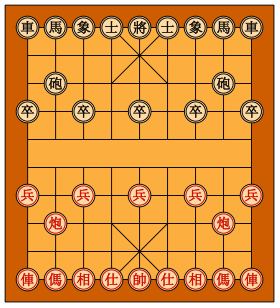
Back Chiangtsi Afrikaans شطرنج صيني Arabic Axedrez chinu AST Çin şahmatı Azerbaijani མིག་མངས། Tibetan Xiangqi Catalan Chiông-gì CDO Čínské šachy Czech Xiangqi Danish Xiangqi German
 Xiangqi board and starting setup | |
| Years active | Late Southern Song (earliest record) to present |
|---|---|
| Genres | |
| Players | 2 |
| Setup time | < 1 minute |
| Playing time |
|
| Chance | None |
| Skills | Strategy, tactics |
| Synonyms |
|
| Xiangqi | |||||||||||||||||||||||||
|---|---|---|---|---|---|---|---|---|---|---|---|---|---|---|---|---|---|---|---|---|---|---|---|---|---|
| Chinese name | |||||||||||||||||||||||||
| Chinese | 象棋 | ||||||||||||||||||||||||
| Literal meaning | Elephant chess | ||||||||||||||||||||||||
| |||||||||||||||||||||||||
| Vietnamese name | |||||||||||||||||||||||||
| Vietnamese | cờ tướng | ||||||||||||||||||||||||
| Hán-Nôm | 碁將 | ||||||||||||||||||||||||
| Literal meaning | General Chess | ||||||||||||||||||||||||
| Korean name | |||||||||||||||||||||||||
| Hangul | 샹치 | ||||||||||||||||||||||||
| Hanja | 象棋 | ||||||||||||||||||||||||
| Literal meaning | Elephant Chess | ||||||||||||||||||||||||
| |||||||||||||||||||||||||
| Japanese name | |||||||||||||||||||||||||
| Kanji | 象棋 | ||||||||||||||||||||||||
| Hiragana | しょうぎ | ||||||||||||||||||||||||
| Katakana | シャンチー | ||||||||||||||||||||||||
| |||||||||||||||||||||||||
Xiangqi (Chinese: 象棋; pinyin: xiàngqí; Wade–Giles: Hsiang ch'i; English: /ˈʃɑːŋtʃi/), commonly known as Chinese chess or elephant chess, is a strategy board game native to China for two players. In Vietnam, the game is also known as cờ tướng, literally 'General's chess'. Xiangqi is in the same family of games as shogi, janggi, Western chess, chaturanga, and Indian chess. Korean janggi originated from it.
The game represents a battle between two armies, with the primary object being to checkmate the enemy's general (king). Distinctive features of xiangqi include the cannon (pao), which must jump to capture; a rule prohibiting the generals from facing each other directly; areas on the board called the river and palace, which restrict the movement of some pieces but enhance that of others; and the placement of the pieces on the intersections of the board lines, rather than within the squares.